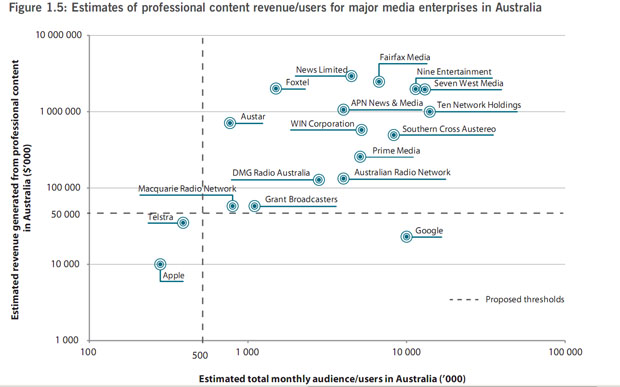Google, Apple dodge proposed content watchdog

A new content regulator, proposed by the Convergence Review, would not oversee Apple, Google or Telstra at current Australian audience and revenue levels, the final report has confirmed.
The Convergence Review, led by ex-IBM Australia CEO Glen Boreham, commenced its investigation back in 2010 into Australia's regulatory landscape for media and communications. After reviewing 340 written submissions and 28,000 comments, the committee released its final report to the public today.
As with the interim report, the final report maintains the recommendation that a new regulator should replace the Australian Communications and Media Authority (ACMA), built around the idea that regulation of content is applied equally across all platforms; whether those platforms be TV, radio or online.
But the report states that far from being a regulator for everything on the internet, there would be a high threshold that companies would need to pass before being considered a "content services enterprise" that will fall under the new regulator.
"The review considers that the threshold levels for content service enterprises initially should be around $50 million a year of Australian-sourced content service revenue and audience/users of 500,000 per month," the report states.

Content Services Enterprise thresholds.
(Screenshot by Josh Taylor/ZDNet Australia)
According to an accompanying chart (above), this threshold would leave out major online players like Apple, Google and Telstra, but would include major Australian broadcasting and publishing companies such as Macquarie Radio Network (the company behind the conservative talkback radio station 2GB), Southern Cross Austereo (owners of 2Day FM), Foxtel, News Limited and Fairfax.
In response to criticism from companies like Telstra that it would be too burdensome for companies with online operations in Australia to submit to this regulation, the committee stated that any company with a significant presence in Australia should be accountable in Australia.
"This is particularly true of those in the media. Just as online banking is regulated in the same way as banking in the branch, significant media enterprises should be expected to meet the expectations of the Australian public irrespective of the platform used."
User-generated content, such as YouTube videos, would not be regulated, but the report noted that in situations where a commercial company, like Google, partnered with content owners, it could become a "content services enterprise".
The new regulator would operate at arm's length from the government and be flexible enough to be able to apply, amend or remove regulation as required, when businesses or technology changes over time. Ministerial control over the regulator would be through ministerial instruments, which can be disallowed by either house of parliament.
"Content services enterprises" would also be required to be a part of a "news standards body" overseeing the standard of news published or broadcasted, and how those enterprises handle complaints from the public. This body would be run by the industry with funding from both industry and the government.
The report also recommends a standard method in the allocation of broadcast spectrum. Instead of requiring broadcasters to pay for a licence for spectrum that is priced as a percentage of their revenue, there would be a market-based approach to pricing broadcast spectrum in a similar way to how spectrum for telecommunications services is priced today. The report stated that this new method would allow licensees to become just a platform operator, and then lease access to content providers. The allocated spectrum would still have to be used to broadcast digital television.
Overall, the changes outlined in the report would require a substantial overhaul to legislation and Australia's regulatory environment. In releasing the report today, Communications Minister Stephen Conroy did not indicate whether the government would support any of the recommendations made, but said the government would respond "in due course".
Greens communications spokesperson, Scott Ludlam, approved of the thresholds for the new regulator proposed in the report.
"Sensibly, the reviewers have focused their attention on the big end of town, estimating 15 media operators would be caught by the reforms, while not impacting on the vast diversity of the blogosphere, independent media and social media networks," he said in a statement.
"The Greens now look forward to working with the many people and organisations who made submissions to this review, to ensure that law reform proposals are in keeping with the public interest in a free and open media."
Comment has been sought from Shadow Communications Minister Malcolm Turnbull, but had not been received at the time of writing.